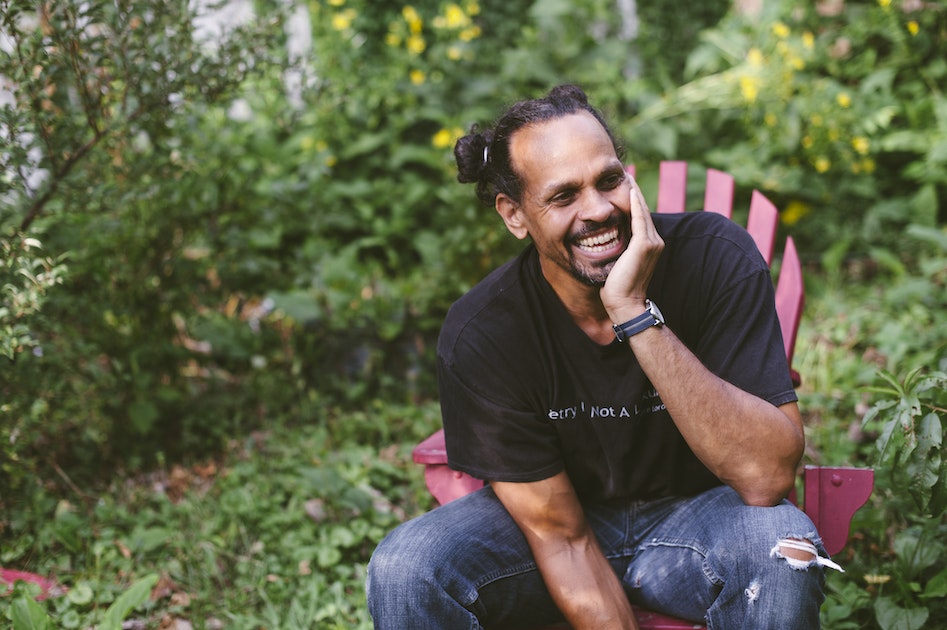
After Ross Gay’s father was diagnosed with stage IV liver cancer, Gay, while caring for his dad, made a surprising and gratifying discovery. His old man had freckles.
“The reason I got that close to him was because he was dying, but the joy it gave me to find out that he had freckles was a kind of grace,” Gay said. “Instead of being purely devastated by his dying, I was flummoxed by his beauty.”
Move over, Oprah Winfrey, and make room for a passionate exponent of finding rainbows in life’s storms. A prolific poet and essayist, Gay writes about his father in “Through My Tears I Saw,” one of 14 essays in his new collection, “Inciting Joy.” He will discuss his essays Nov. 2 at the Fitzgerald Theater in St. Paul to close out the 23rd season of Talking Volumes, a collaboration between the Star Tribune and Minnesota Public Radio.
Evocative images cascade through “Inciting Joy,” and all of them orbit the notion of finding grace and solace amidst hardships and setbacks. An avid gardener and onetime skateboarder who now teaches English at Indiana University, Gay draws from his everyday life tending the soil, from playing pickup basketball and from his memories, weaving words that dazzle and also take off in a myriad of directions.
Think of a beaming sculpture made of shards of glass. Joy, as Gay sees it, is that reflection, misunderstood though it may be.
“Joy is the light that comes from us as we carry each other through our sorrows — and no one gets out of this life without sorrow,” Gay said. “It feels like an accomplishment of becoming grown is to understand that life and death are not separated.”
In many ways, “Inciting Joy” is part of a larger quest that Gay took up years ago with other, self-expressive titles, namely the poetry book, “Catalog of Unabashed Gratitude” and the essay collection, “The Book of Delights.” He’s on a mission to have people reconsider some of these things that we take for granted, or that we misconstrue altogether.
Joy, delight, gratitude — these are the high twins to lots of low happenings in life. They are the light that can be found, if you pay attention, in the dreariest of circumstances.
Passion for poetry
Born in Youngstown, Ohio, Gay grew up in Philadelphia, a jock. He played basketball and football and didn’t even catch the poetry bug until he was at Lafayette College. There, he had a poetry class that he was drifting in when a teacher assigned him a poem by Amiri Baraka, the firebrand writer who wrote essays and plays, including “Dutchman.”
That lit his imagination and set him on a path that included earning a doctorate at Temple University. As he has grown into himself, he has spread his passions with words in four books of poetry and two essay collections, all while teaching. He marries his love of sports with words in the book-length poem “Be Holding,” which orbits the wondrous flights of basketball great Julius “Dr. J” Erving.
Gay may eschew the word evangelist — he has his own spiritual beliefs — but he has been a proselytizer for joy, and he wants to make us all believers in its virtues. He evokes his father again.
“I was lucky enough to meet his need, which also met a need of mine,” Gay said. “His death was a profound sorrow but also an incitement of joy.”
Gay also wants us to see joy as a major subject deserving of rigorous critical inquiry.
“The notion that it is not serious and worthy of study is feeble and imagines some kind of quote-unquote pure life without pain and without sorrow,” Gay said. “At the supermarket, I notice the magazines at the cash register and realize there’s a whole machinery to get us out of the fundamental understanding that sorrow is inescapable.”
Why now
He has gotten the question, and taken some grief, about why he is writing about joy at this juncture of history, especially as the latest social justice movement, this one ignited by the killing of George Floyd, continues. The query is off-base, Gay said, but he’s always happy to tackle it.
“The question I get is how can I, a Black man, be talking about flowers at a moment like this?” he said. “That question is rooted in a profound misunderstanding of how we have survived. We do not survive what has murdered us by studying how we die but by studying and passing on what has kept us alive. That’s a joyful proposition for me. When people talk about epigenetic trauma, I’m quick to say, yes, but there’s also epigenetic joy.”
Gay is not alone in his quest. He references Zadie Smith in “Inciting Joy,” and her notion that joy is connected to the intolerable and that it is the intolerable that makes life worthwhile.
Gay frames it differently. There’s no joy without the terrible things in life. The heights and depths are paired with each other and help to define each. He evokes pastor and futurist Erwin Raphael McManus and his book, “The Way of the Warrior: An Ancient Path to Inner Peace.”
“He talks about the practice of smiling with tears in your eyes,” Gay said. “That has never left me. This is one of the origins of this way of being. You might have emotional, mental trouble, but you’re also alive.”
Gay had written about his father in his first book, the 2006 poetry collection “Against Which.” The seeds of “Inciting Joy” are suffused in the poem “Thank You,” the last in the collection:
If you find yourself half naked
and barefoot in the frosty grass, hearing,
again, the earth’s great, sonorous moan that says
you are the air of the now and gone, that says
all you love will turn to dust,
and will meet you there, do not
raise your fist. Do not raise
your small voice against it. And do not
take cover. Instead, curl your toes
into the grass, watch the cloud
ascending from your lips. Walk
through the garden’s dormant splendor.
Say only, thank you.
Thank you.
Inciting Joy
By: Ross Gay.
Publisher: Algonquin, 256 pages, $27.
Event: Gay will appear at Talking Volumes, 7 p.m. Nov. 2, $30-28. Musical guest: Mayyadda . Tickets at: https://www.ticketsales.com/talking-volumes-featuring-ross-gay-tickets-fitzgerald-theater/event/4030792
An excerpt of ‘Inciting Joy’
Baby. This Might Be You.
(Laughter: The Sixth Incitement):
This might be an obvious one, or seem like it, but not to me. Because, like every single thing, I was shown it by someone else, it was given to me, in this case by my beloved Dave, aka Tornado, aka Poppa, who one day noted that sometimes when I get laughing — and Dave is often the origin of that laughter, I mean my god I love him, I hope you have a friend like Dave — he said I looked like I was dying. I think he said it like this: “Sometimes when you laugh you look like you’re dying.”
And he imitated my dying, I mean my dying with laughter, squinting hard and my mouth wrenched into a grimace and shaking my head “no” and my hand out into the air and often kind of falling off whatever it is I’m sitting on, a chair or bench or, in Dave’s old house, where I used to sleep over a lot, on the couch, which I called the dream couch for how intense and marvelous my dreams on it were. He would fall off whatever he was sitting on, arm out, crawl on his hands and knees, before collapsing onto his stomach, like a fish, smiling. Which would make me, once again, die with laughter.
I think I’ve heard, for what it’s worth, laughter is one of the ways we indicate peaceability, like, you know, You can let down your guard lets have some lemonade, etc. But it is also one of the ways, in my experience anyway, we consider our dying. We laugh along with our dying. Or, as Dave puts it in a poem, “Laughter is our way of letting the universe know we agree with the passage of time.”
From “Inciting Joy: Essays” by Ross Gay. Reprinted by permission of Algonquin Books. Copyright © 2022 by Ross Gay. All rights reserved.






